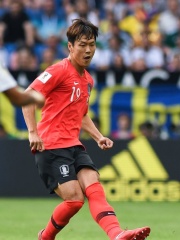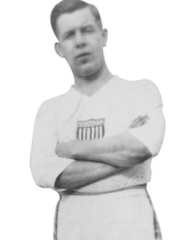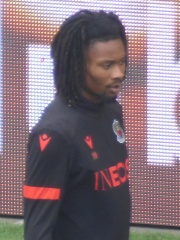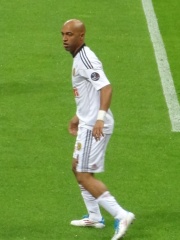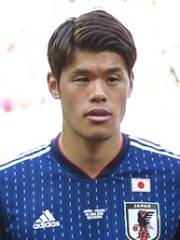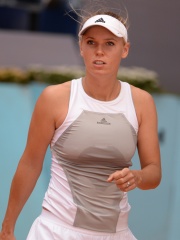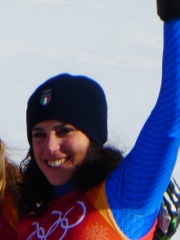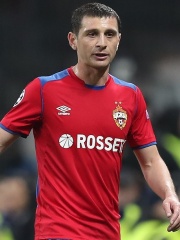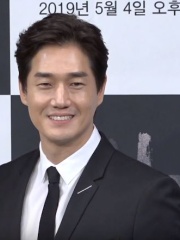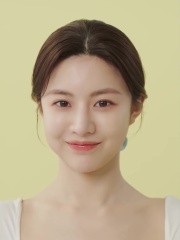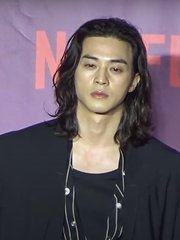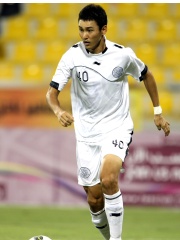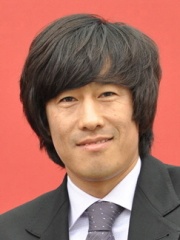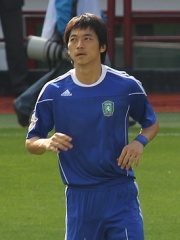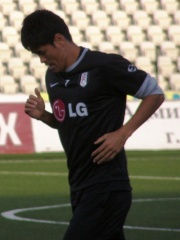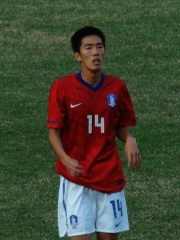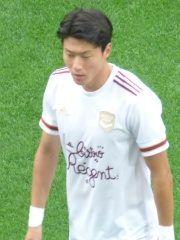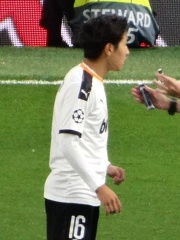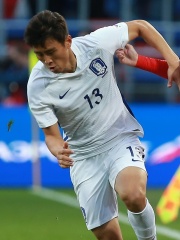Soccer Player
Kim Young-gwon
1990 - today
EN.WIKIPEDIA PAGE VIEWS (PV)
 Kim Young-gwon
Kim Young-gwon
His biography is available in 40 different languages on Wikipedia (up from 38 in 2024). Kim Young-gwon is the 6,226th most popular soccer player (up from 6,957th in 2024), the 503rd most popular biography from South Korea (up from 559th in 2019) and the 31st most popular South Korean Soccer Player.
Memorability Metrics
Page views of Kim Young-gwon by language
Among Soccer Players
Among soccer players, Kim Young-gwon ranks 6,226 out of 21,273. Before him are Andy Auld, Alphonso Davies, Khéphren Thuram, Tetsuya Totsuka, Hitoshi Sasaki, and Dedé. After him are Yusuke Ishii, Lionello Manfredonia, Alex Scott, Oleg Kopayev, Antonio Arias, and Christopher Nkunku.
Most Popular Soccer Players in Wikipedia
Go to all RankingsAndy Auld
1900 - 1977
HPI: 50.54
Rank: 6,226
Alphonso Davies
2000 - Present
HPI: 50.54
Rank: 6,227
Khéphren Thuram
2001 - Present
HPI: 50.54
Rank: 6,228
Tetsuya Totsuka
1961 - Present
HPI: 50.54
Rank: 6,229
Hitoshi Sasaki
1973 - Present
HPI: 50.54
Rank: 6,230
Dedé
1978 - Present
HPI: 50.54
Rank: 6,231
Kim Young-gwon
1990 - Present
HPI: 50.54
Rank: 6,232
Yusuke Ishii
1991 - Present
HPI: 50.54
Rank: 6,233
Lionello Manfredonia
1956 - Present
HPI: 50.53
Rank: 6,234
Alex Scott
1984 - Present
HPI: 50.53
Rank: 6,235
Oleg Kopayev
1937 - 2010
HPI: 50.53
Rank: 6,236
Antonio Arias
1944 - Present
HPI: 50.53
Rank: 6,237
Christopher Nkunku
1997 - Present
HPI: 50.53
Rank: 6,238
Contemporaries
Among people born in 1990, Kim Young-gwon ranks 133. Before him are Hiroki Sakai, Fagner Ribeiro da Costa, Indiana Evans, Caitlin Stasey, Caroline Wozniacki, and Haruma Miura. After him are Danny Welbeck, Kieran Trippier, Federica Brignone, Diego Contento, Lu Han, and Alan Dzagoev.
Others Born in 1990
Go to all RankingsHiroki Sakai
SOCCER PLAYER
1990 - Present
HPI: 50.92
Rank: 127
Fagner Ribeiro da Costa
SOCCER PLAYER
1990 - Present
HPI: 50.91
Rank: 128
Indiana Evans
ACTOR
1990 - Present
HPI: 50.83
Rank: 129
Caitlin Stasey
ACTOR
1990 - Present
HPI: 50.77
Rank: 130
Caroline Wozniacki
TENNIS PLAYER
1990 - Present
HPI: 50.67
Rank: 131
Haruma Miura
ACTOR
1990 - 2020
HPI: 50.62
Rank: 132
Kim Young-gwon
SOCCER PLAYER
1990 - Present
HPI: 50.54
Rank: 133
Danny Welbeck
SOCCER PLAYER
1990 - Present
HPI: 50.48
Rank: 134
Kieran Trippier
SOCCER PLAYER
1990 - Present
HPI: 50.40
Rank: 135
Federica Brignone
SKIER
1990 - Present
HPI: 50.40
Rank: 136
Diego Contento
SOCCER PLAYER
1990 - Present
HPI: 50.37
Rank: 137
Lu Han
SINGER
1990 - Present
HPI: 50.36
Rank: 138
Alan Dzagoev
SOCCER PLAYER
1990 - Present
HPI: 50.35
Rank: 139
In South Korea
Among people born in South Korea, Kim Young-gwon ranks 503 out of NaN. Before him are Kim Sun-a (1973), Go Soo (1978), Lee Da-hae (1984), Joo Jin-mo (1974), Yoo Ji-tae (1976), and Go Youn-jung (1996). After him are Cho Kyu-hyun (1988), Lee Soo-hyuk (1988), Eugene (1981), Park Gyu-young (1993), Park Joo-bong (1964), and Kim Ji-hoon (1981).
Others born in South Korea
Go to all RankingsKim Sun-a
ACTOR
1973 - Present
HPI: 50.76
Rank: 497
Go Soo
ACTOR
1978 - Present
HPI: 50.74
Rank: 498
Lee Da-hae
ACTOR
1984 - Present
HPI: 50.70
Rank: 499
Joo Jin-mo
ACTOR
1974 - Present
HPI: 50.70
Rank: 500
Yoo Ji-tae
ACTOR
1976 - Present
HPI: 50.69
Rank: 501
Go Youn-jung
ACTOR
1996 - Present
HPI: 50.57
Rank: 502
Kim Young-gwon
SOCCER PLAYER
1990 - Present
HPI: 50.54
Rank: 503
Cho Kyu-hyun
SINGER
1988 - Present
HPI: 50.54
Rank: 504
Lee Soo-hyuk
ACTOR
1988 - Present
HPI: 50.54
Rank: 505
Eugene
ACTOR
1981 - Present
HPI: 50.54
Rank: 506
Park Gyu-young
ACTOR
1993 - Present
HPI: 50.54
Rank: 507
Park Joo-bong
BADMINTON PLAYER
1964 - Present
HPI: 50.54
Rank: 508
Kim Ji-hoon
ACTOR
1981 - Present
HPI: 50.53
Rank: 509
Among Soccer Players In South Korea
Among soccer players born in South Korea, Kim Young-gwon ranks 31. Before him are Choi In-young (1962), Lee Jung-soo (1980), Seo Jung-won (1970), Kim Nam-il (1977), Chung Hae-won (1959), and Seol Ki-hyeon (1979). After him are Kim Jung-woo (1982), Choi Dae-shik (1965), Hwang Ui-jo (1992), Lee Kang-in (2001), Choi Jin-cheul (1971), and Koo Ja-cheol (1989).
Choi In-young
1962 - Present
HPI: 51.87
Rank: 25
Lee Jung-soo
1980 - Present
HPI: 51.79
Rank: 26
Seo Jung-won
1970 - Present
HPI: 51.31
Rank: 27
Kim Nam-il
1977 - Present
HPI: 51.15
Rank: 28
Chung Hae-won
1959 - 2020
HPI: 51.09
Rank: 29
Seol Ki-hyeon
1979 - Present
HPI: 50.92
Rank: 30
Kim Young-gwon
1990 - Present
HPI: 50.54
Rank: 31
Kim Jung-woo
1982 - Present
HPI: 50.37
Rank: 32
Choi Dae-shik
1965 - 2024
HPI: 50.36
Rank: 33
Hwang Ui-jo
1992 - Present
HPI: 50.32
Rank: 34
Lee Kang-in
2001 - Present
HPI: 50.22
Rank: 35
Choi Jin-cheul
1971 - Present
HPI: 50.05
Rank: 36
Koo Ja-cheol
1989 - Present
HPI: 49.85
Rank: 37
